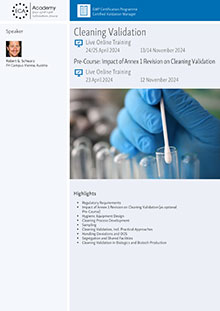Warning Letter on Combination Products 21 CFR 4

Recommendation
23-25 April 2024
For several years, combination products have been regulated by 21 CFR 4 in the USA. In September 2017, the FDA issued a Warning Letter to a manufacturer of combination products. What did the FDA criticise?
Combination products are products consisting of two or more components (e. g. medicinal product/medical device, biologic/medical device, medicinal product/biologic, medicinal product/medical device/biologic); this also includes individual products of those combinations which have been packed together. The independent GMP regulations (21 CFR 4) for combination products build a bridge between the relevant GMP regulations for medicinal products (21 CFR 210/211) and the GMP regulations for medical devices (21 CFR 820, QSR). The Warning Letter is structured that way, as well. It criticised the production of an adrenaline auto-injector (pen). First, the deficiencies related to the drug product were listed. It mentioned deficiencies regarding 21 CFR 211.192 on failure investigation of components. Interestingly, a footnote indicated that 21 CFR 820.100 (CAPA) should be taken into account, as well. The complaint handling (21 CFR 211.198) was criticised as well, also with a reference to 21 CFR 820.100 in a footnote. It was said amongst other things, that the classification of deficiencies was not adjusted to the risk to patients. The FDA criticises further that trend analyses had no scientific or statistic basis. Even the company's response, in which it assures the FDA that statistic analyses of batches would be performed, was found inadequate. According to the FDA, it lacks the assessment of inter-batch variabilities. It is not enough for them to only observe intra-batch variabilities.
Referring to the medical device of the combination product, the FDA cites deficiencies relating to 21 CFR 820.100 (CAPA), and consequently references 21 CFR 211.198 to be considered in a footnote, which is the exact opposite of the description above. It was criticised, amongst other things, that the reasons for defective parts were not determined, only the number of defective parts in total. The calculation of process capability indices was also criticised. The calculation was performed with data from end products; however, defective parts had been sorted out beforehand and not been taken into account for the calculation. The FDA sees problems being able to evaluate reoccurring errors with this method. FDA also criticises that the trending of deficiencies is not statistically ensured. They demand a statistical analysis to justify the definition of a trend. Deficiencies regarding design controls (21 CFR 820.30) were also criticised. The company could not prove that the design result equals the design input, even though it was working with statistical sampling plans as per ANO/ASQ Z 1.4-2013. The FDA also spoke of missing design validation, especially the missing risk analysis for it. While there had been a risk analysis, it had been unchanged since 2009... The missing design validation is particularly tragic in this case since the malfunction of the pen has also been the cause of deaths. The deficiencies occurred yet again and had already been detected in earlier inspections.
As a conclusion, the FDA describes a generally insufficient facility oversight and production control. They demand a rapid correction of the errors and threaten to withhold authorisations in which the company is named. Within five days of receiving the Warning Letter, the company is to schedule a meeting with the FDA; within 15 days, the company is to inform the FDA about the measures the company has taken since the inspection to eradicate the errors and prevent their reoccurrence.
For further details please see the complete FDA Warning Letter to Meridian Medical Technologies.
Combination Products are also in the centre of attention of the ECA course Combination Products - Medicinal Products/Drugs meet Medical Devices in January 2018.
Related GMP News
GMP Conferences by Topics
- General Quality Assurance and GMP Compliance Topics
- Hygiene
- General Microbiology Topics
- Regulatory Affairs
- Development
- General Analytics Topics
- Good Distribution Practice
- Sterile Manufacturing
- Computer Validation
- General Qualification/Validation Topics
- General Engineering Topics
- APIs/Excipients
- GMP Basic Training Courses
- Medical Devices and Combination Products
- Packaging and Packaging Material
- Data Integrity
- Qualified Person (QP)
- GMP Auditing
- Documentation
- Cleaning Validation
- General IT Compliance Topics
- Impurities
- OOS / OOE / OOT
- Material Testing
- Validation of Analytical Methods
- Analytical Instrument Qualification
- Stability Testing
- Microbiological Testing
- Technology
- General Manufacturing Topics
- Solid Dosage Forms/Semi-Solid Dosage Forms
- Biotechnology/Blood/ATMP
- Herbal Drug Products/Cannabis/Radiopharmaceuticals
- Others



